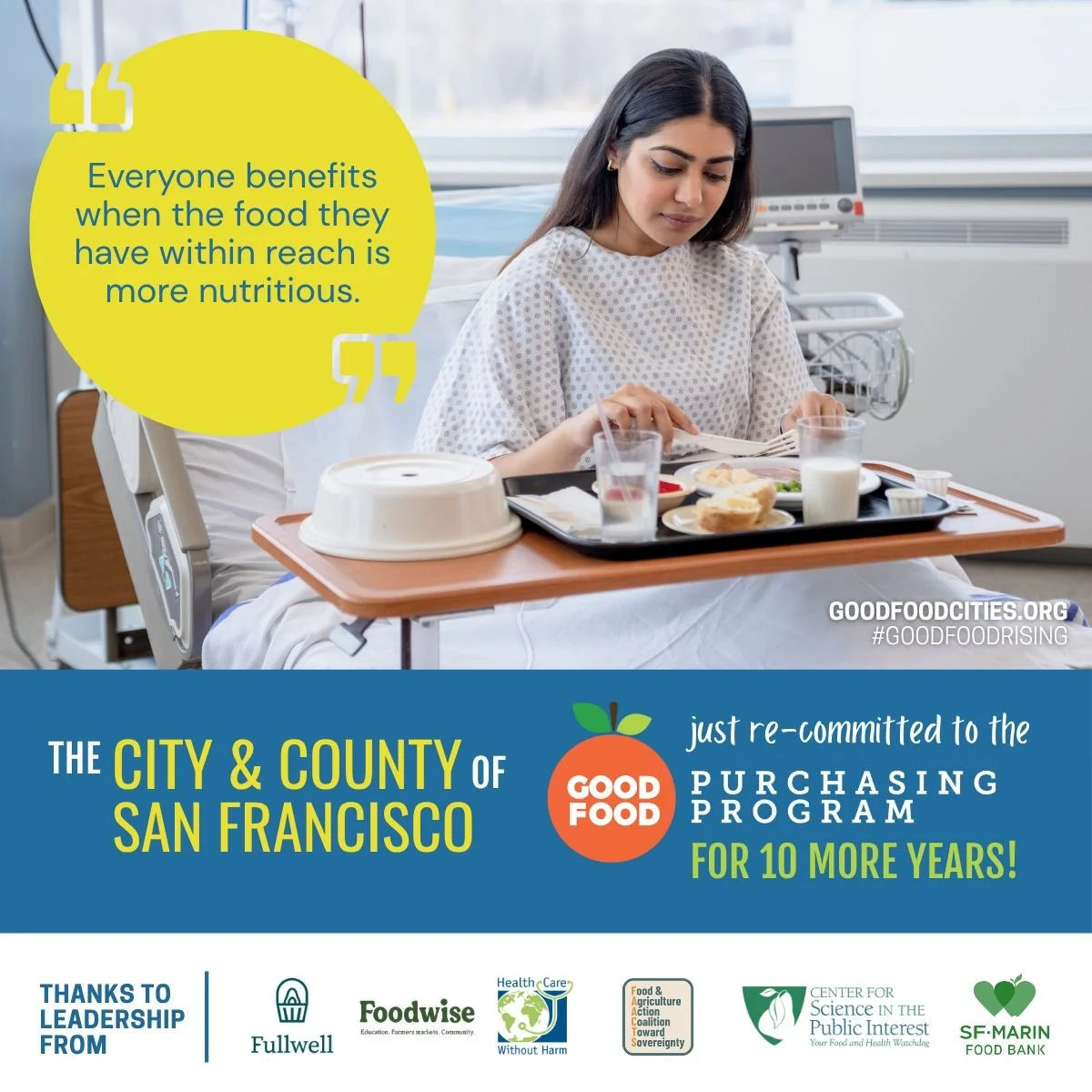A Second Course for Good Food in San Francisco: SF Hospitals and Jails to continue improvements on food purchases for the next 10 years
This September the Board of Supervisors and Mayor Lurie reaffirmed their commitments to a more sustainable and healthy San Francisco by updating a 2020 sustainable food purchasing ordinance and pledging to continue implementation for the next decade.
With this renewal, hospitals and jails operated by the City and County of San Francisco, which serve some of the most vulnerable San Franciscans, will continue to buy food that is grown or produced closer to the city; improve the quality of meat served; and increase transparency by publicly reporting on what food is being purchased with public dollars. This is the latest phase in the city’s effort to ensure tax dollars go toward the purchase of food that is better for people and the planet.
In 2016, San Francisco Unified District was the first agency to adopt the Good Food Purchasing Program (GFPP). The city then followed in their footsteps in 2018, when the Board of Supervisors passed a resolution requiring the Department of Public Health and Sheriff’s Department to review their food purchases. They completed baseline assessments using GFPP standards which showed that these two departments spent a combined $7.5 million on food every year. The baseline also evaluated how well the Departments’ existing food vendors aligned with the Good Food Purchasing standards and informed goals which were then codified by the Board of Supervisors in 2020 when the original Food Purchasing Ordinance was passed.
The Good Food Purchasing Program standards are based on five core values:
Local and Community-based Economies: Support small and mid-sized agricultural and food processing operations within the local area or region.
Environmental Sustainability: Source from producers that employ sustainable production systems that reduce or eliminate synthetic pesticides and fertilizers; avoid the use of hormones, routine antibiotics and genetic engineering; conserve soil and water; protect and enhance wildlife habitats and biodiversity; and reduce on-farm energy and water consumption, food waste and greenhouse gas emissions; and increase menu options that have lower carbon and water footprints.
Valued Workforce: Provide safe and healthy working conditions and fair compensation for all food chain workers and producers from production to consumption.
Animal Welfare: Provide healthy and humane care for farm animals.
Community Health and Nutrition: Promote health and well-being by offering generous portions of vegetables, fruit, whole grains and minimally processed foods, while reducing salt, added sugars, saturated fats, and red meat consumption, and eliminating artificial additives. Improving equity, affordability, accessibility, and consumption of high quality culturally relevant Good Food in all communities.
Supporting a Better Food Future:
Fullwell and a coalition of organizations including FAACTS, Healthcare Without Harm, GLIDE and San Francisco Marin Food Bank have advocated for GFPP in San Francisco for the last 10 years. This year Fullwell leveraged the knowledge of the coalition to advocate for the Board of Supervisors to update the 2020 ordinance which was set to expire this year and to ensure ongoing GFPP participation for the city’s hospital and jails.
A key part of those updates was a requirement to retroactively share all assessments completed since 2020 and to publicly share all assessments moving forward. We are excited to see how food purchases have changed when the Sheriff’s Department and the Department of Public Health share their assessments later this year.
The renewed 10-year commitment and additional transparency ensures that San Francisco continues to be part of building a future where our tax dollars go further by serving nutritious food while benefiting the local economy, the environment, workers, and animals.
Thank you to all members of the SF Good Purchasing Coalition whose advocacy was pivotal for passing the 10-year renewal of the San Francisco Food Purchases Ordinance.
Read the coalition letter here
To get involved contact Grecia Marquez-Nieblas, gmarquez-nieblas@fullwell.us


